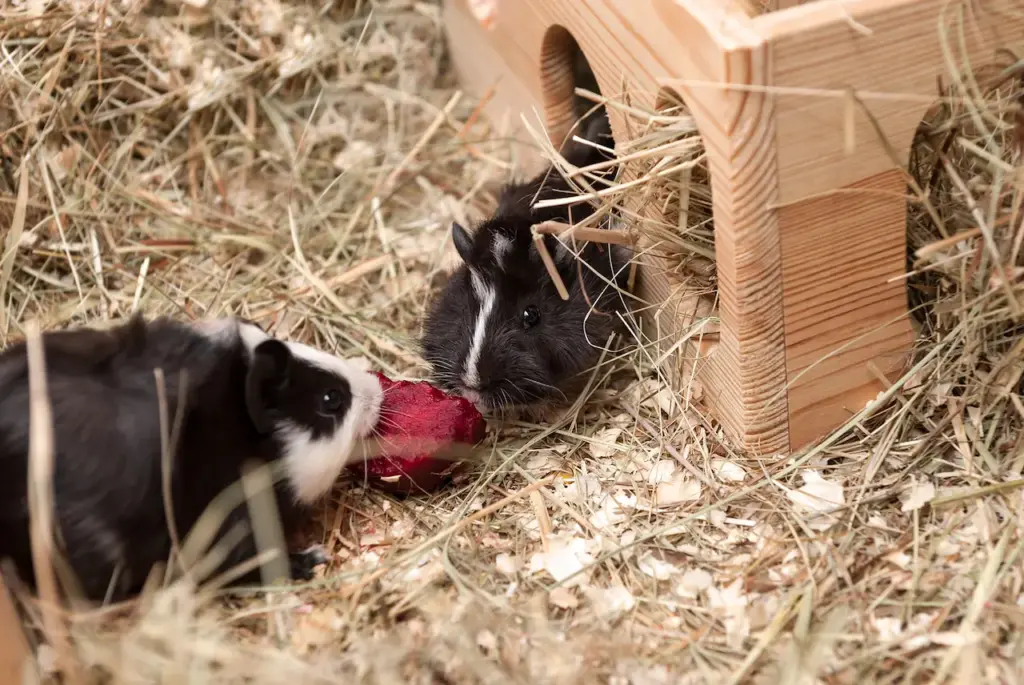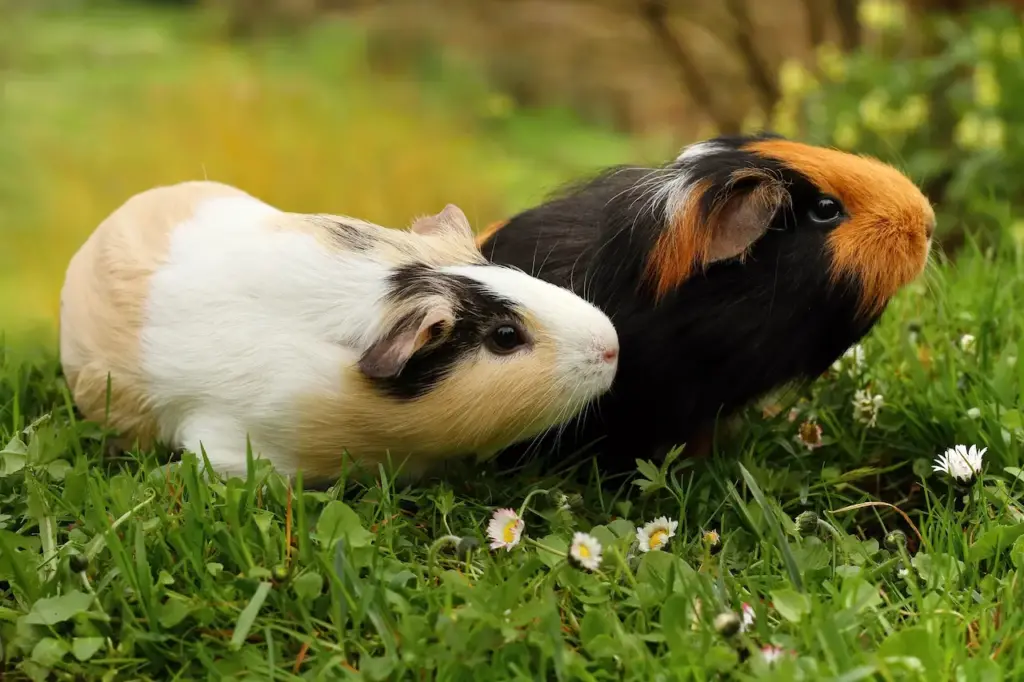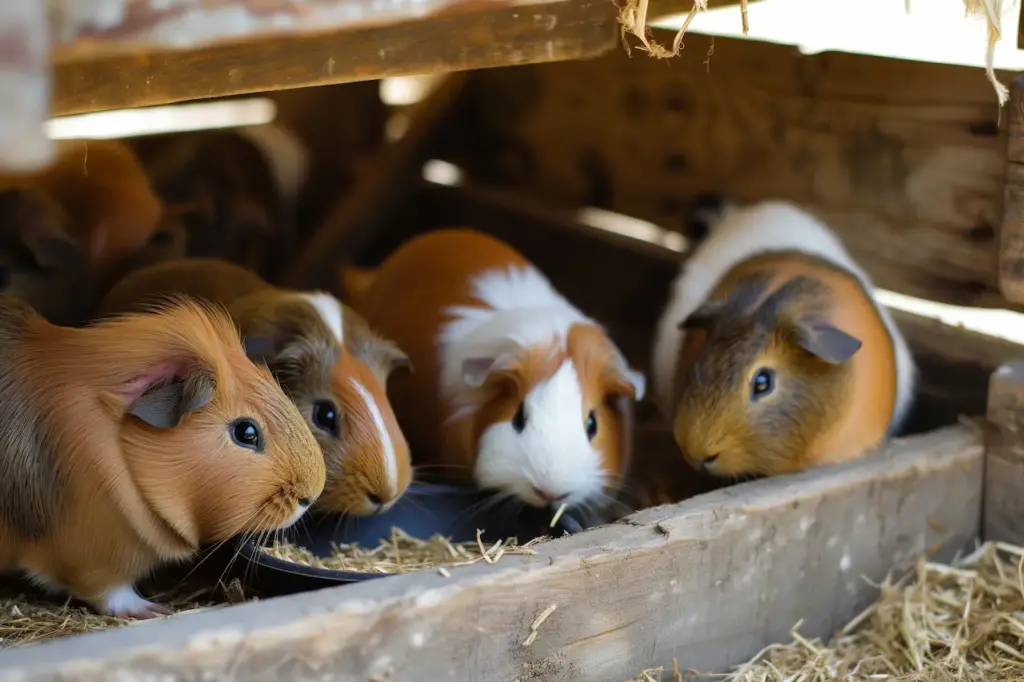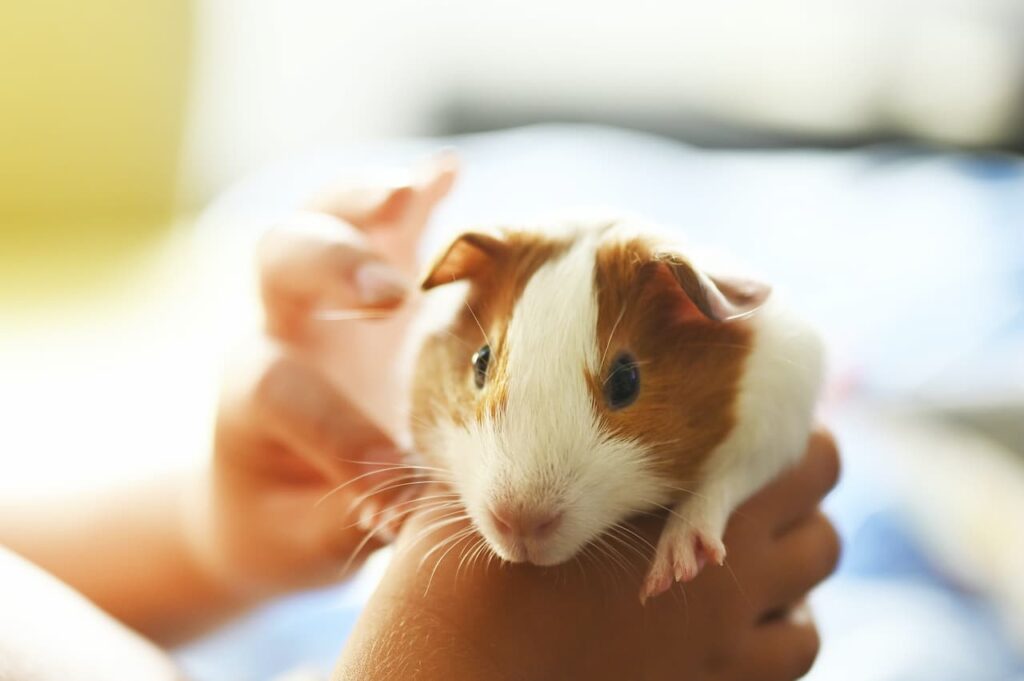Can Guinea Pigs Eat Raspberries?
Guinea pigs are allowed to eat raspberries in small quantities. You should read both the benefits and drawbacks of eating raspberries for your guinea pig so that you can decide if it is healthy or not!
Table of Contents
Toggle“Can guinea pigs eat raspberries?” This seemingly straightforward inquiry opens a window into the intricate world of guinea pig nutrition, prompting an exploration of the suitability of raspberries as a dietary component for these beloved small pets. Raspberries, celebrated for their vibrant colour, sweet-tart flavour, and nutritional richness, are a common fruit enjoyed by humans. However, whether they are safe and beneficial for guinea pigs requires a deeper investigation into their nutritional composition, the dietary needs of guinea pigs, and potential considerations for feeding them to these furry companions.

Guinea pigs, scientifically known as Cavia porcellus, are herbivorous rodents native to the Andes region of South America. They are cherished as popular pets worldwide for their gentle nature, sociable disposition, and endearing personalities. In the wild, guinea pigs primarily consume a diet of grasses, herbs, and leafy greens, supplemented by occasional fruits, vegetables, and other plant matter. Therefore, providing a balanced and species-appropriate diet is crucial for meeting the nutritional needs of pet guinea pigs.
Raspberries, belonging to the genus Rubus, are small, edible fruits that grow on brambles in various regions around the world. They are renowned for their antioxidant properties, owing to their rich content of vitamin C, anthocyanins, and other phytochemicals. Raspberries also provide dietary fibre, vitamins (such as vitamin K), minerals (including manganese and magnesium), and trace elements, making them a nutritious addition to human diets.
When considering whether guinea pigs can eat raspberries, it’s essential to evaluate the nutritional composition of these fruits and how they align with the dietary requirements of guinea pigs. Guinea pigs have specific nutritional needs that differ from those of humans and other animals. They require a diet high in fibre, low in fat, and rich in vitamin C to support their unique physiological processes, including digestion, dental health, and immune function.
Raspberries can offer several potential benefits when incorporated into a guinea pig’s diet. The high fibre content in raspberries supports digestive health by promoting regular bowel movements and preventing constipation—a common concern in guinea pigs. Additionally, the vitamin C found in raspberries is essential for guinea pigs, as they are unable to synthesize this vitamin internally and must obtain it from their diet. Adequate vitamin C intake is crucial for preventing scurvy, a condition characterized by weakness, lethargy, and dental problems in guinea pigs.
Despite the potential benefits of raspberries, it’s essential to exercise caution when feeding them to guinea pigs. While raspberries themselves are generally safe for guinea pigs to consume, certain considerations must be taken into account. Firstly, raspberries should be offered in moderation as part of a balanced diet. Excessive consumption of raspberries or any fruit can lead to nutritional imbalances and health issues in guinea pigs. It’s crucial to ensure that raspberries are served in appropriate portion sizes relative to the guinea pig’s size and dietary needs.
Furthermore, raspberries should be washed thoroughly before feeding them to guinea pigs to remove any potential pesticides, contaminants, or residues. Organic raspberries may be preferable, as they are less likely to contain harmful chemicals. Additionally, raspberries should be served fresh and ripe, as mouldy or spoiled raspberries can cause digestive upset and other health problems in guinea pigs.
Another consideration when feeding raspberries to guinea pigs is their individual preferences and tolerances. Like humans, guinea pigs may have varying tastes and digestive sensitivities. Some guinea pigs may eagerly devour raspberries, while others may show little interest or experience digestive upset after consumption. It’s essential to observe your guinea pig’s response to raspberries and adjust their diet accordingly. If a guinea pig displays signs of gastrointestinal discomfort, such as bloating, diarrhea, or decreased appetite, it’s advisable to discontinue feeding raspberries and consult a veterinarian if necessary.
In addition to raspberries, guinea pigs should be offered a variety of fresh fruits, vegetables, and hay to ensure a balanced and nutritious diet. Leafy greens such as kale, spinach, and romaine lettuce are excellent sources of vitamins and minerals for guinea pigs. Additionally, high-quality hay should constitute the majority of a guinea pig’s diet, as it provides essential fibre for dental and digestive health.

In conclusion, raspberries can be a safe and nutritious treat for guinea pigs when offered in moderation and with careful consideration. They provide dietary fibre, vitamin C, and other essential nutrients that support guinea pig health and well-being. However, moderation, proper preparation, and attentiveness to individual guinea pig preferences and tolerances are crucial when incorporating raspberries into their diet. By considering these factors, guinea pig owners can provide their furry companions with a varied and enriching diet while promoting their overall health and longevity.
What vitamins, minerals and nutrients are present in raspberries?
Vitamin C
This vitamin helps to boost immunity and prevents infections and other illnesses. It is vital to prevent infections, which can be deadly for Guinea pigs. This is something we want to avoid!
Vitamin C is also important for the growth and repair of all tissues in the body, especially in young guinea pigs who are still developing and growing. ! It helps to absorb iron which is essential for maintaining healthy blood by creating proteins. These proteins play a huge role in oxygen transportation throughout the body. In 100g, there are 26.2 mg.
Iron
Iron is necessary to keep the blood healthy and prevent anemia. Iron is also required for the production of hemoglobin. This protein, found in red blood cells that transports oxygen throughout the body, is essential. Myoglobin is also made from it, and this oxygenates muscles. You may not realize how important oxygen transport is!
Oxygen plays a crucial role in almost all bodily functions. It is essential for the synthesis of tissues and to be properly oxygenated during physical activity. As you may know, it is important to keep your guinea pigs active to maintain their health. In 100g, there is 0.7mg.
Phosphorus
It helps to balance calcium intake and promotes bone growth! Its main role is to help form bones and teeth. This works in conjunction with calcium.
Calcium is essential for the body of the guinea pig, but you should feed it in moderation to avoid urinary tract infections or other problems. Calcium also affects how the body processes carbohydrates and fats.
You don’t want to feed your guinea pig too much of either because their bodies can’t process them. For the small amounts that guinea pigs encounter, their bodies need enough phosphorus to process and use them. A 100 g serving contains 29 mg.
What are the other benefits raspberries can provide to your guinea pig?
Raspberries also contain a variety of other nutrients! Some components can help maintain good vision. This fruit is also low in fat, so there’s no need to worry about weight gain. The consumption of raspberries may also aid in blood clotting and bone metabolism.
What is the downside of raspberries to guinea pigs?
Even though raspberries are a great food for your piggies, they can have some downsides. They can cause upset stomachs if they contain too much fibre. The high calcium content can cause calcium deposits to form in the urine of your pig, causing discomfort and pain.
Xylitol is another compound that is dangerous to many animals. It can cause hypoglycemia in guinea pigs because it is absorbed so quickly into their bloodstream.

Guinea pigs are allowed to eat raspberries. But do they enjoy it?
Yes! Yes!
What should you feed your guinea pig raspberry berries?
You should limit the amount of raspberries you give your guinea pig. As a treat, raspberries should be offered to your guinea pig no more than once or twice per week. The serving size is only one or maybe two raspberries.
To ensure your guinea pig doesn’t have an adverse reaction, start with a small amount. You can then give your guinea pig the full amount of one or two raspberries once you have determined that they can handle it.
In general, you can feed raspberries to your guinea pigs!
You can add the fruit to their diet once you have done a trial run. All fruits and vegetables should be consumed in moderation. This will ensure they are not only healthy but happy!


